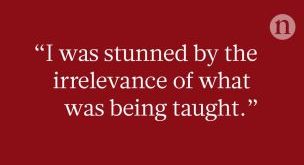from Lars Syll I believe that as an economic theorist, I have very little to say about the real world and that there are very few models in economic theory that can be used to provide serious advice. However, economic theory has real effects. I cannot ignore the fact that our work as teachers and researchers influences students’ minds and does so in a way with which I am not comfortable. Can we find a way to be relevant without being charlatans? As economic theorists, we organize our...
Read More »Growth and Growth
Gross World Product source Global Carbon Dioxide Emissions source
Read More »Why monetary policies are impotent
from Lars Syll Even if interest-rate cuts at all points proximately increase demand, there are substantial grounds for concern if this effect is weak. It may be that any short-run demand benefit is offset by the adverse effects of lower rates on subsequent performance … From a macro perspective, low interest rates promote leverage and asset bubbles by reducing borrowing costs and discount factors, and encouraging investors to reach for yield. Almost every account of the 2008 financial...
Read More »Austerity-obsessed Europe could combat climate change without raising taxes
from Dean Baker In the United States, there has been much attention given to the various proposals for a Green New Deal. While there have been legitimate questions about paying for a large push to reduce greenhouse gas emissions, many accept the need for such measures for the survival of the planet. However, there has been less attention paid to the failure of European countries to act in this area, in spite of the fact that a substantial program would be virtually costless for Europe....
Read More »Open thread Sept. 3, 2019
Why is current economic growth called strong?
As of the second quarter the year over year percent change in real GDP is 2.3%. Virtually everyone refers to this as strong. Why? By historic standards 2.3% real GDP growth is subpar. It is below the long term growth rate of the economy using virtually any widely accepted estimate of trend or potential growth. Many republicans actually claim that the potential growth rate is now 4%. If so, it would only make Trump’s 2%-3% growth look worse. In 1967,...
Read More »The slogan should be, “Save Sapiens.”
from Ken Zimmerman First, let’s get the story about climate change right before we look to the Amazon. Climate change will certainly impact the planet in dozens of ways. But it is extremely unlikely it will destroy the planet. So the slogan should be, “Save Sapiens.” Climate change impacts will make human life on the planet more difficult, perhaps even impossible. By fighting climate change, humans are fighting to save themselves. For us today, it’s sometimes difficult to comprehend just...
Read More »Monday Message Board
Another Monday Message Board. Post comments on any topic. Civil discussion and no coarse language please. Side discussions and idees fixes to the sandpits, please. If you would like to receive my (hopefully) regular email news, please sign up using the following link http://eepurl.com/dAv6sX You can also follow me on Twitter @JohnQuiggin, at my Facebook public page and at my Economics in Two Lessons page Like this:Like Loading...
Read More »Cherry-picking economic models
from Lars Syll How would you react if a renowned physicist, say, Richard Feynman, was telling you that sometimes force is proportional to acceleration and at other times it is proportional to acceleration squared? I guess you would be unimpressed. But actually, what most mainstream economists do amounts to the same strange thing when it comes to theory development and model modification. In mainstream economic theory, preferences are standardly expressed in the form of a utility...
Read More »The incentive for pushing opioids: patent monopolies
from Dean Baker It’s probably too simple and obvious to be worth mentioning, but it seems none of the news coverage on the suits against opioid manufacturers say that the reason that companies like Purdue Pharma and Johnson & Johnson had so much incentive to push their drugs was that the government gave them patent monopolies that allowed them to sell their products for prices that were far above the free market level. While generic manufacturers also made money on opioids, the...
Read More » Heterodox
Heterodox




